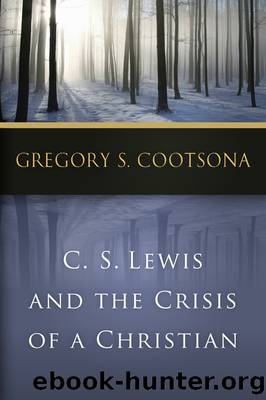C. S. Lewis and The Crisis of a Christian by Gregory S. Cootsona

Author:Gregory S. Cootsona
Language: eng
Format: epub
ISBN: 9781611645361
Publisher: Westminster John Knox Press
He also portrayed this conviction in The Last Battle, where the character of Emeth embodies this other side: that those who donât hear about Jesus in life can be saved. Put another way, there is salvation outside of the church. (This has been a famous theological question through the ages: âIs there salvation outside the walls of the church?â In other words, salvation for those who havenât heard.) Emeth (whose name means âtruthâ in Hebrew) has been a Calormene prince who has never served Aslan but who instead serves the god of his country, Tash. When he dies, heâs surprised to find that Aslan greets him in the life to come with allusions to Jeremiah 29:13 and Matthew 7:7: âAll the service thou hast done to Tash, I account as service done to meâ¦. For all find what they truly seek.â20
EVALUATION
My overall contention in this book is that Lewis has something to say not simply to mid-twentieth-century Christians but to contemporary Christians well. How, then, do I evaluate Lewisâs fulfillment model of Jesus in a world of pluralism? How well does the âliar, Lord, lunaticâ argument work today?
Iâll begin with some concerns.
His âliar, Lord, or lunaticâ argument needs further engagement with other noncanonical gospels, especially those popularized by books such as the bestseller of all time, The Da Vinci Code. These noncanonical sources have only gained in acclaim since his death. In my opinion, many of them are so late and tainted by gnostic thought that they are not historically useful, at least not useful in understanding the historical Jesus of Nazareth. Nevertheless, in some there is some strong historical tradition, such as that embedded within the Gospel of Thomas. Although I realize this topic engenders considerable debate today, historically the most secure documents for finding out about Jesus are the biblical Gospels.21 And yet, Lewisâs argument would have been stronger had he engaged more thoroughly with these sources.
The contemporary reader probably also brings a higher degree of skepticism about the Christian church. Lewis does not spend much time on the uniqueness of the Christian church, which remains a key issue today for those outside the church. Or perhaps better formulated, Lewis sees a fairly direct line of continuity between believing in Jesus and the community of believers in Jesus as the church. We will see in the next chapter that the authority of the Bible depends, for Lewis, on the testimony of the Christian community or the church. Certainly, as he famously wrote, he promoted âmere Christianity,â not any particular denomination. Still, for many there is no direct line from belief in Jesus as the Son of God to belief in the church, but the churchâs witnessâand its veracityâis critical to judging the Gospels as reliable.
In some ways, it would be nicer to soften the Gospelsâ claim of the unique status of Jesus. As much as that would make our lives easier, the emphasis of the Bible and the confessions of Christianity over time state that something singular happened in Jesus.
Download
This site does not store any files on its server. We only index and link to content provided by other sites. Please contact the content providers to delete copyright contents if any and email us, we'll remove relevant links or contents immediately.
The 5 Love Languages: The Secret to Love That Lasts by Gary Chapman(8527)
The Space Between by Michelle L. Teichman(6098)
Assassin’s Fate by Robin Hobb(5254)
Wiseguy by Nicholas Pileggi(4601)
Everything Happens for a Reason by Kate Bowler(4076)
Gerald's Game by Stephen King(3927)
A Simplified Life by Emily Ley(3579)
The Power of Positive Thinking by Norman Vincent Peale(3461)
Pillow Thoughts by Courtney Peppernell(3414)
Resisting Happiness by Matthew Kelly(2891)
Girl, Wash Your Face by Rachel Hollis(2828)
Being Aware of Being Aware by Rupert Spira(2711)
Name Book, The: Over 10,000 Names--Their Meanings, Origins, and Spiritual Significance by Astoria Dorothy(2496)
Real Sex by Lauren F. Winner(2481)
More Language of Letting Go: 366 New Daily Meditations by Melody Beattie(2456)
The Holy Spirit by Billy Graham(2425)
Fast Facts on Defending Your Faith by John Ankerberg & John Weldon(2394)
Victory over the Darkness by Neil T. Anderson(2389)
The Secret Power of Speaking God's Word by Joyce Meyer(2257)
